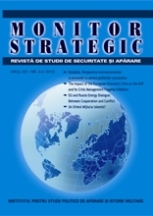Prețul puterii în Belarus se calculează la Moscova
The price of power in Belarus is calculated in Moscow
Author(s): Cristian Alexandru EremiaSubject(s): Politics, Communication studies, International relations/trade, Security and defense, ICT Information and Communications Technologies, Geopolitics
Published by: Editura Militară
Keywords: Republic of Belarus; Russia; presidential election; unrest; protests; national security; social confrontation; risks and security threats; informational war; hybrid war; russian suport;
Summary/Abstract: Large-scale social unrest and protests of the citizens of the Republic of Belarus have been taking place in the country since the beginning of August 2020. Protesters accuse authorities of falsifying the results of the August 9th presidential elections. They demanded that dictator Lukashenko leave power, that another free and fair election be held, and that political prisoners be released from prison. They also demanded that those guilty of violence against peaceful protesters be brought to justice. It has become clear that during all this time, the pro-Western opposition has not been able to make significant progress and the opposition will not be allowed to take power in Minsk. President Lukashenko has resumed friendship with the Kremlin and called on Moscow’s support to stay in power, indicating that resolving the internal political crisis in Belarus will now be a process controlled exclusively by Moscow. Russia will, at the same time, reject any western interference. The support of the Belarusian president from the Kremlin will be made according to a scenario mounted in Moscow and will be done mainly in order not to allow the derailment of the Belarusian state on any western trajectory. And to finally move to a comprehensive integration of the Republic of Belarus into the Russian space, also following a Russian scenario. Of course, all these gestures of Moscow will involve costs that are difficult to assess, but which most likely the people of Belarus and Lukashennko will have to pay. At the close of this analytical material, however, it is difficult to make predictions about the next stages of escalation of the internal conflict, the prospects for normalizing the situation and the fate of the Belarusian dictator. Probably even for the most knowledgeable connoisseurs of the Belarusian space.
Journal: Monitor Strategic
- Issue Year: 2020
- Issue No: 3-4
- Page Range: 25-35
- Page Count: 11
- Language: Romanian

